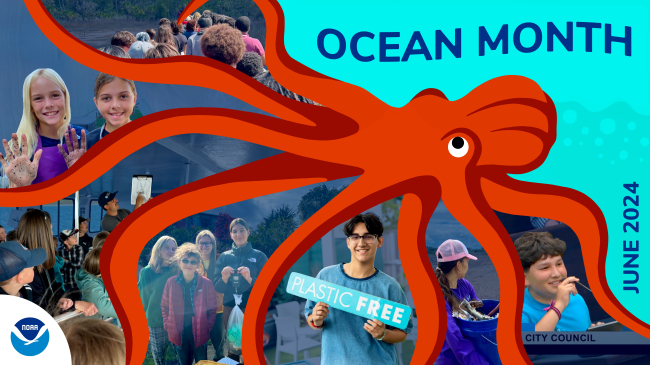Six NOAA employees were recognized at the annual Women of Color in STEM conference offsite link, which was held October 3-5, 2019, in Detroit, Michigan. These awards offsite link recognize significant achievement in science, technology, engineering, and math (STEM).
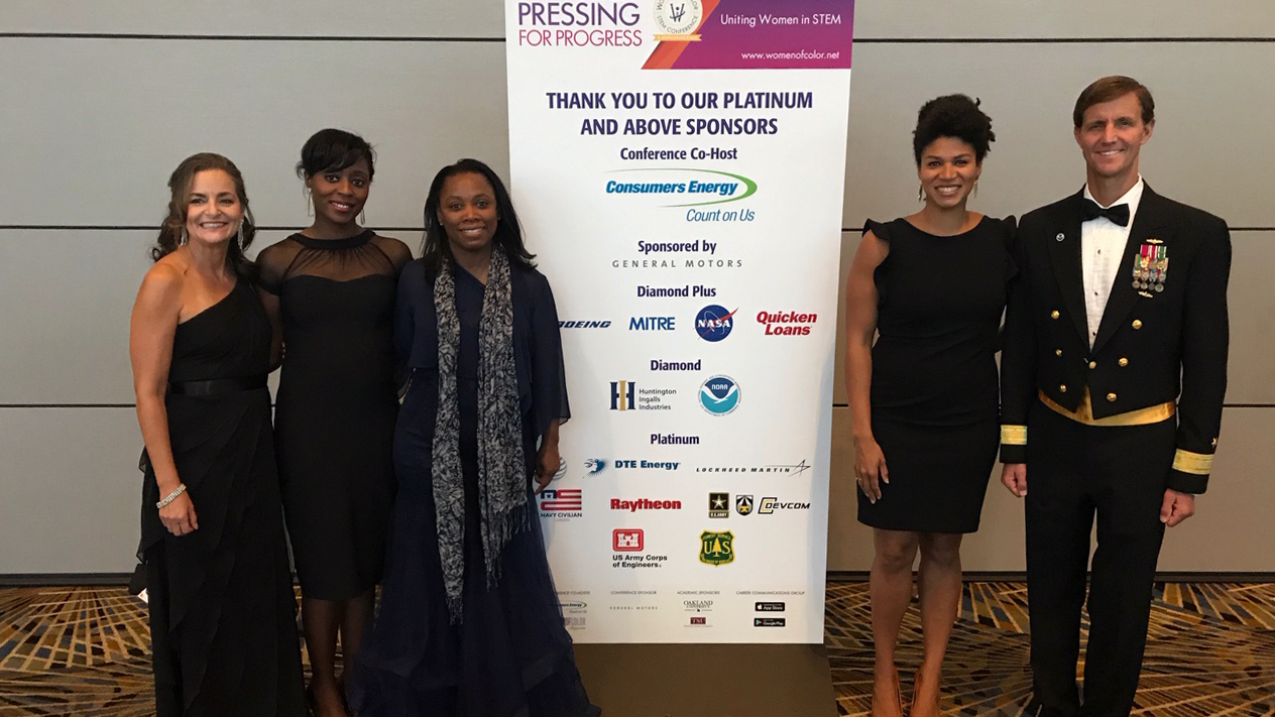
Women of Color in STEM awardees — from left to right, Catalina Martinez, Laurita Alomassor, Sheekela Baker-Yeboah, and Aja Szumylo — are joined by RDML Timothy Gallaudet, assistant secretary of commerce for oceans and atmosphere, at the 2019 Women of Color in STEM Conference in Detroit, Michigan. (Image credit: Courtesy of Jamese Sims)
“Congratulations to NOAA’s inspiring award recipients,” said Louisa Koch, Director of NOAA Education. “It's rewarding to see these women recognized for their outstanding accomplishments. I am proud to work for an organization that is committed to building a talented, diverse and inclusive workforce. Many of these awardees are former NOAA scholars, fellows, or graduates of historically black colleges and universities that NOAA has worked closely with for many years."
Here, these inspiring experts share their paths to a career at NOAA and their advice for future STEM leaders.
Catalina Martinez, Peer-Reviewed Award
Catalina Martinez is the regional program manager for NOAA’s Office of Ocean Exploration and Research (OER). Catalina joined NOAA in 2002 as a Knauss Marine Policy Fellow supporting OER. Her career at NOAA has spanned 18 years, and her current responsibilities involve managing key partnerships at the University of Rhode Island (URI) associated with a telepresence-enabled ship-based ocean exploration program. This unique program evolved over many years of collaborative efforts between OER, URI, and the Ocean Exploration Trust, culminating in URI being awarded the NOAA Cooperative Institute for Ocean Exploration in 2019. Catalina also supports a variety of local, regional, and national efforts to face the issues and challenges associated with underrepresented people of color entering, persisting, and finding success in STEM fields.
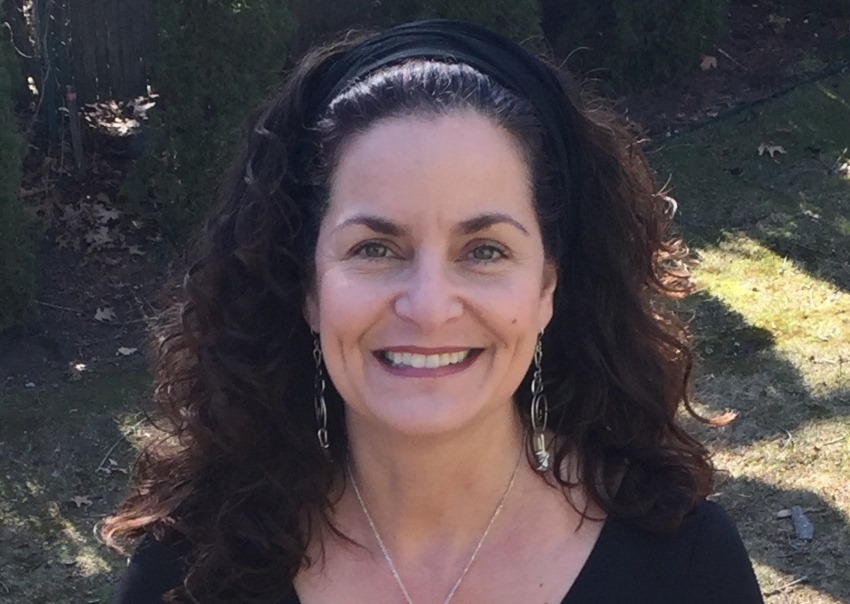
I'm not exactly sure what sparked my interest in STEM. Somehow, growing up in an urban community in Providence, Rhode Island, without proper science instruction in school, I was always fascinated by nature and by any and all water bodies — even puddles! I wanted to know what creatures lived in them and what the bottom looked like, so maybe my career path was inevitable. At some point, I began to explore the gorgeous Rhode Island coastline on my own, learned to SCUBA dive in my early 20’s, and I’ve been in love with the ocean ever since. After chipping away at an undergraduate degree for many years while working multiple jobs to make ends meet, I finally got to a place where I could attend a 4-year university full-time. I was determined to learn as much as I could about the ocean, and all the weird and wonderful creatures that existed within it. I didn’t consider a practical application for studying ocean science at that point, but there were a few key mentors and experiences that really paved the way for my decision to go on to graduate school and study oceanography — and I’m glad I did!
2. What’s the best part about working at NOAA?The best part of my 18 years with NOAA OER has been participating in the evolution of a brand new, exciting office within a federal agency that has a mission I truly believe in. I’ve been very fortunate.
3. What advice would you give to up-and-coming STEM professionals?
I have a few key pieces of advice:
- Never limit your vision of who you can become or where you belong based on who and what you see around you today — or on the perception of others.
- Be prepared to work very hard to achieve your goals.
- Surround yourself with good people you trust who are going to champion you, and always be intentional about championing others yourself.
- Self advocate and seek opportunities.
- Don’t underestimate the importance of developing strong communication skills and learning to work well with people from all walks of life.
Dr. Jamese Sims, Peer-Reviewed Award
Jamese Sims is a senior physical scientist at the Office of the Federal Coordinator for Meteorological Services and Supporting Research, where she manages interagency committees and working groups to coordinate meteorological services across the federal weather enterprise. Jamese was introduced to NOAA as a summer student in the NOAA Educational Partnership Program with Minority Serving Institutions (EPP/MSI) Undergraduate Scholarship Program in 2003. She was later selected as a member of NOAA’s EPP/MSI Graduate Sciences Program. In her career at NOAA, since has supported projects spanning operational environmental satellites, satellite telemetry, climate services, and coastal inundation. She has received numerous awards, including the Women of Color Magazine Professional Achievement in Government Award, the NOAA Educational Partnership Program (EPP) with Minority Serving Institutions Center Champions Working Group Award, and NOAA Employee of the Month. Jamese received her B.S. in meteorology from Jackson State University and her Ph.D. in atmospheric sciences from Howard University.
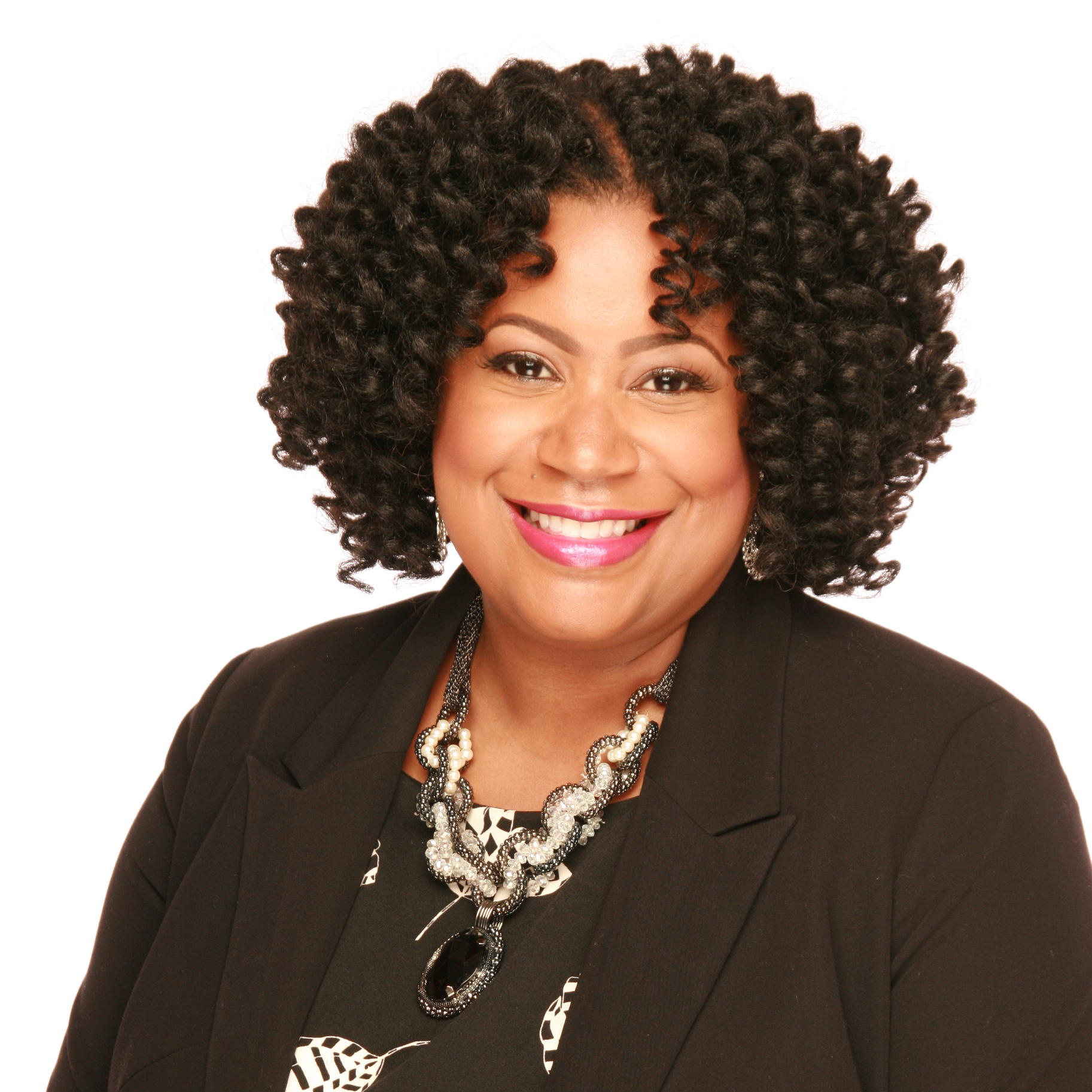
1. What sparked your interest in STEM?
I have always been curious about how things work. I remember as a child wanting to take the television apart to see how the channels changed. I was also the person in the house that my parents and my sister would call on to fix things. It was natural for me to figure out the answers to math calculations in my head, and I thoroughly enjoyed chemistry and biology in high school.
Additionally, I was curious about weather patterns as a child. I wanted to better understand different climates, and I was also intrigued by how my grandmother would predict the weather just from looking at the clouds or by her arthritis. Furthermore, my mom would take my sister and me to view severe storm and tornado damage when it occurred in the areas surrounding our town.
Even though I had this curiosity as a child, I did not think of it as a career until I attended Jackson State University. During my freshman year, my college algebra teacher encouraged me to major in a science field. After I did some research and thought hard about my future, I changed my major from Accounting to Meteorology.
2. What’s the best part about working at NOAA?
I strongly enjoy being able to solve problems and overcome challenges. I love that this field and my work are constant learning curves with new scientific discoveries and technology that advance our understanding of our environment. I also enjoy developing collaborations within NOAA and with external partners surrounding various topics in order to gain consensus and implement scientific and engineering solutions that save lives.
Your voice and opinion matters. You have what it takes to make a difference. Don’t shrink back based on someone else’s opinions or stereotypes. You define who you are and that typically doesn’t fit into anyone else’s box.
Ask for help along the way. It’s great to be independent, but many things are achieved more efficiently as a team with diverse experiences and mindsets.
Enjoy your journey. It’s important to celebrate achievements and small successes that assist you in reaching your goals.
Tell your STEM story. “You have a story to tell and it needs to be told,” in the words of my mentor, Cindy Woods, the National Weather Service Operations Division chief. This advice has helped me to own who I am and be proud of my journey. It helps me confidently seek opportunities that fit my unique interests.
Laurita Alomassor, Technology All-Star Award
Laurita Alomassor is a physical oceanographer for the NOAA National Ocean Service (NOS), where she coordinates activities for research and development, leads strategic initiatives for integrated ocean and modeling plan, and is responsible for disseminating water level and meteorological products and services. Laurita completed a detail assignment as the NOS program coordination officer, where she provided policy and staff support to the Office of the NOAA Administrator. Previously, Laurita worked as a geospatial analyst at the NOAA National Ice Center in Suitland, Maryland and, as a geospatial analyst at the former NOAA National Coastal Data Development Center at Stennis Space Center, Mississippi. Laurita received her B.S. in meteorology from Jackson State University in 2004 and a Master of Public Administration degree from American University in 2017.
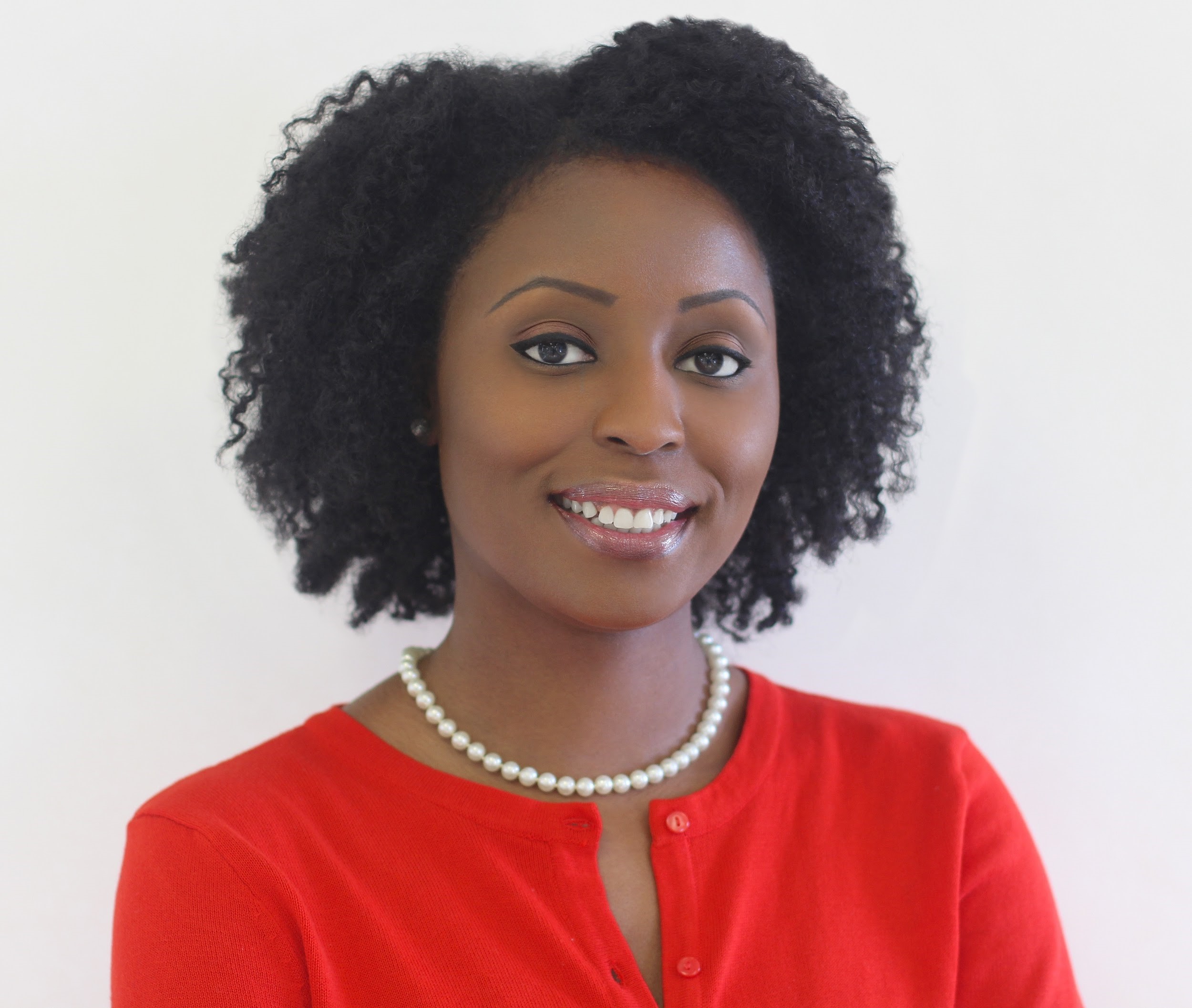
Most people know that southern states experience some of the worst severe weather in the country. As a young kid in Mississippi, I experienced severe thunderstorms often and was inspired to become a meteorologist. Plus, severe weather was the most exciting thing on television. Additionally, both of my parents are also STEM stars! My mom was an accountant for our local school district and my dad owns a car repair business and is a pro at engineering things. I’d like to say numbers and problem solving are in my genes.
2. What’s the best part about working at NOAA? There are two great parts of working at NOAA: the people I get to work with and the people I get to work for. I have worked at NOAA for over 15 years, and I have encountered some very brilliant and passionate people, with some of whom I have established life-long friendships and bonds. NOAA’s mission drives me to be the best I can be because we are all about public service and stewardship. Plus, the data NOAA collects protects and saves lives. What can be better than that!3. What advice would you give to up-and-coming STEM professionals?
Don’t be afraid to lead with purpose, no matter what level you are at within the organization. A lot of times people believe that they need to be in a leadership position to be a leader. That is not always the case. Be a leader no matter your role, position, or title. Think about the activities you can do that will influence others in a positive way. It’s true that you must understand the technical parts of your career, but in order to be successful you must learn now to influence others and effect change in society.
Dr. Sheekela Baker-Yeboah, Technology Rising Star Award
Sheekela Baker-Yeboah is a physical oceanographer working for the University of Maryland to support NOAA’s Center for Satellite Applications and Research. She focuses on physical and biological implications of ocean eddies and develops products using ocean color, altimetry, and sea surface temperature data. Previously, she was the satellite team lead at NOAA’s National Centers for Environmental Information, in collaboration with the University of Maryland. Sheekela received the 2018 NOAA Bronze Medal Career Award for early deployment of the NOAA Jason-3 Satellite Ground System. She received her Ph.D. in oceanography from the University of Rhode Island and completed a post-doc at the Massachusetts Institute of Technology (MIT). Her previous professional appointments include research scientist at MIT, a visiting professor at Worcester Polytechnic Institute of Massachusetts, and visiting professor at Lesley University of Cambridge, Massachusetts.
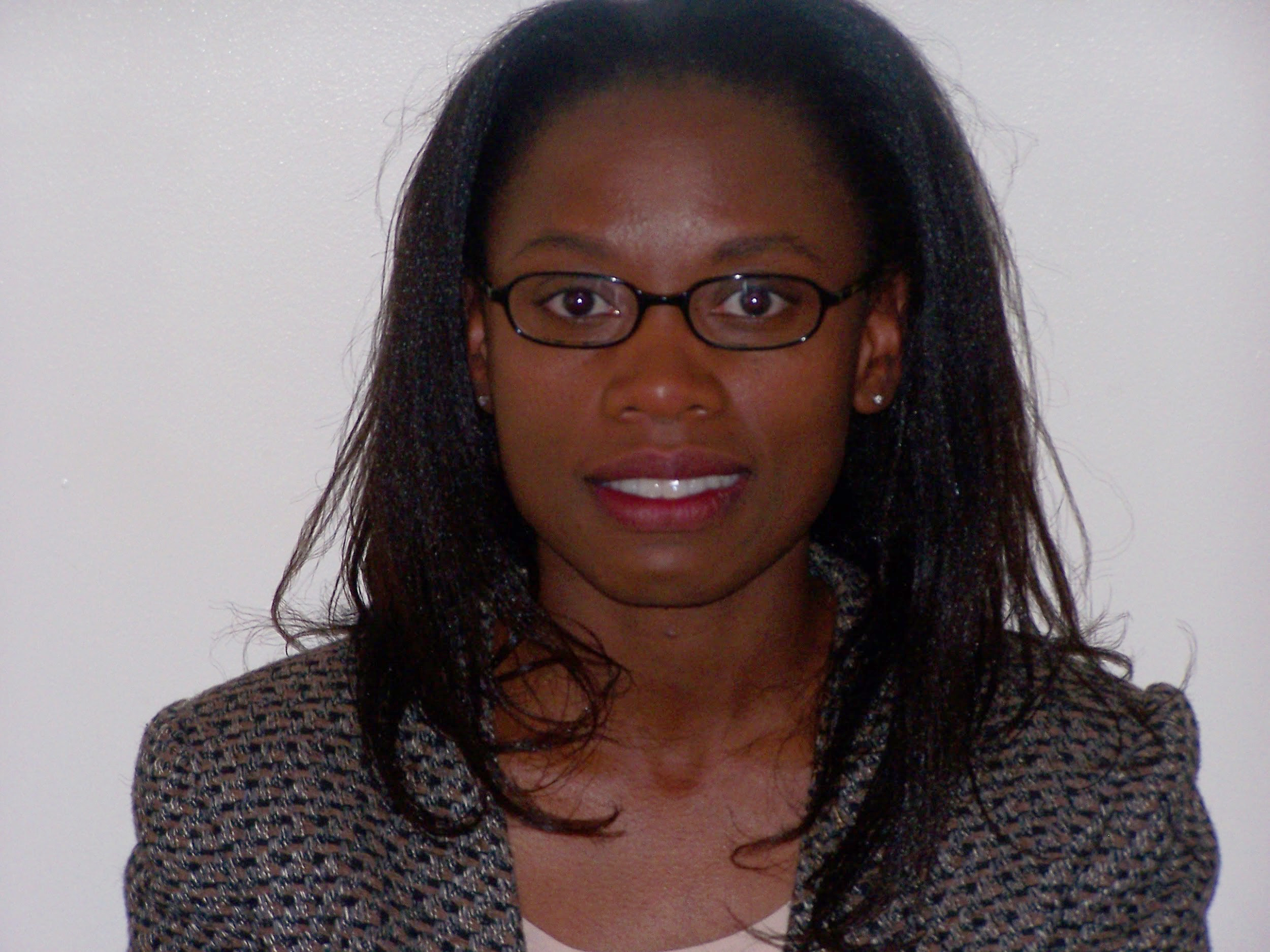
I think my interest in STEM subjects has always been natural for me.I have generally enjoyed taking such coursework, and I was always good at mathematics.
2. What’s the best part about working at NOAA?One of the best aspects of working with NOAA is being an integral part of an organization that serves the nation, from people who use satellite data to surf to those needing it for search and rescue efforts to help those in need.
3. What advice would you give to up-and-coming STEM professionals?Some advice I would pass along to upcoming STEM professionals: 1) remain steadfast in your efforts and desires to be a STEM professional and to remember that you have a role to play in the improved understanding of the world we live in, as so much is still unknown to us in this vast universe; 2) remember to give back to those upcoming STEM students, especially our young ones, who have yet to reach their full potential.
Dr. Ayeisha Brinson, Technology Rising Star Award
Ayeisha Brinson was a senior economist working with NOAA’s Office of the Chief Economist. Ayeisha joined NOAA in 2009 and previously worked in NOAA Fisheries’ Office of Science and Technology in Silver Spring, Maryland, and the Northeast Fisheries Science Center in Woods Hole, Massachusetts. In fall 2019, Ayeisha left NOAA and joined the U.S. Department of the Treasury International Affairs as an environmental economist. Ayeisha received her Ph.D. from the University of Miami, Rosenstiel School of Marine and Atmospheric Science, where she completed an interdisciplinary fisheries and economics Ph.D. Ayeisha has a B.S. from the University of Florida and M.S. from Colorado State University.
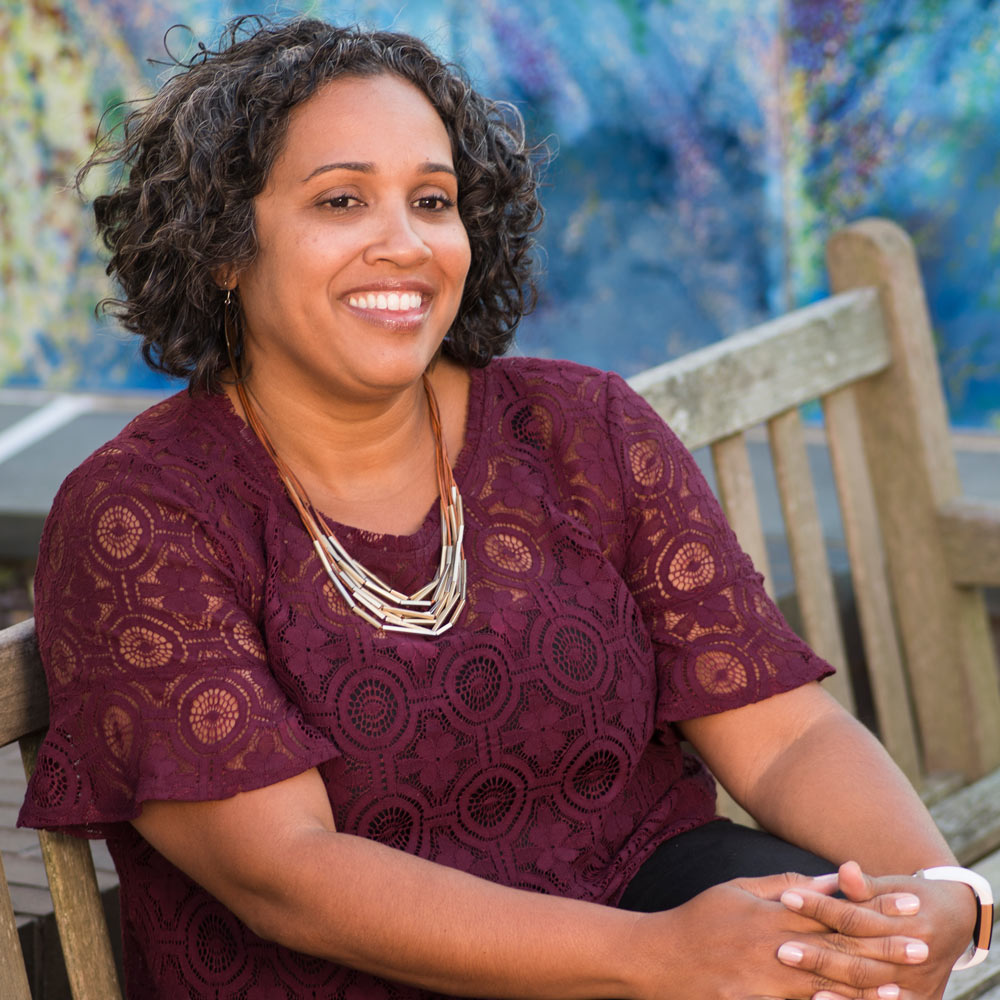
While I was in high school, I participated in a summer program sponsored by the National Science Foundation that introduced me to environmental issues, such as acid rain. Following that experience, I decided to focus on studying environmental and natural resource issues in college. Throughout my studies and the early part of my career, I realized that resource management really depends upon the human element, and I decided to focus upon better understanding the social and economic issues associated with resource management. This is what led me to pursue an interdisciplinary graduate program that focused upon issues such as economics and coastal management.
2. What was the best part about working at NOAA?The best part about NOAA was the workforce. NOAA’s workforce is dedicated and supports the mission each and every day.
3. What advice would you give to up-and-coming STEM professionals?Oftentimes, it seems as if there is one path for STEM professionals, and I don’t believe that to be true. Be open to all kinds of experiences, don’t be afraid of failure or seeking opportunities that don’t fit the ‘norm.’ Oftentimes, what is perceived as a failure may lead to a great discovery or a career path that you really enjoy.
Aja Szumylo, Technology Rising Star Award
As a supervisory fishery management specialist, Aja leads a group of analysts to develop policies and regulations for fishing in federal waters off of Washington, Oregon, and California. She coordinates policy development, rulemaking, and management programs for the Pacific Coast groundfish fishery and the coastal pelagic species fishery. Aja first worked with NOAA Fisheries as a contractor at the Northwest Fisheries Science Center in Seattle, Washington, as a fisheries social scientist. She later worked as a fishery policy analyst on fishery management plans for seven years in New England before becoming the chief of the Groundfish and Coastal Pelagic Species Branch for the West Coast Region in 2018. She holds an undergraduate degree in biology from Swarthmore College and a Master’s in environmental management from Duke University.
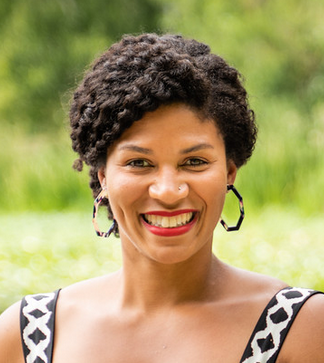
For as long as I can remember, I wanted to be a marine biologist. I grew up in Virginia, but my family is from the Caribbean. I remember being stunned by how beautiful the ocean was on our family visits to various islands and wanting to figure out a way to work in or near the ocean as an adult.
I was lucky enough to have a marine biology course in high school in northern Virginia. I also had an amazing, engaging AP Biology teacher who led me to pursue biology as my undergraduate major.
While pursuing my undergraduate biology degree, I quickly realized that I didn’t enjoy aspects of being a research scientist. I chose a study abroad program through the School for Field Studies in Turks and Caicos. The program had coursework in the various fields that support fisheries management — biology, economics, law, policy. I enjoyed how these fields intersect in environmental challenges. My job today is a blend of these disciplines.
2. What’s the best part about working at NOAA?I work with brilliant professionals who do fascinating, important work. I largely work with staff in NOAA Fisheries, but have had the chance through details and training opportunities to interact with people in other NOAA line and staff offices. Talking with staff from other line offices is especially energizing because it reminds me how important NOAA’s mission is — how our earth and ocean observation work and our regulatory work affects so many Americans.
3. What advice would you give to up-and-coming STEM professionals?Talk to people who do jobs that look interesting to you. Many adult professionals are happy to discuss the training and opportunities that led them to their current position, and highlight the pros and cons of different lines of work. I did an internship at the National Aquarium and quickly learned through the work and conversations with aquarists and my experience working there that being an aquarist would not energize me. You may try on different careers and find they do not fit, but that is all important information for finding the right career path.



